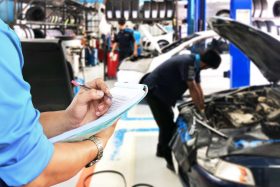Car Damaged at the Repair Shop: Who’s Responsible?

When people bring their cars in for repairs, they do so feeling like the mechanic’s shop is one of the safest places it could be. After all, the people who work there know cars inside and out and are supposed to be experts at taking good care of them, right? The last thing anyone expects after taking their car into the shop for repairs is to find out that their car was damaged while in the mechanic’s care. But this is something that happens more often than you might realize.
Recently, a woman took her brand new car to a dealership in Houston, Texas for its first routine service visit. Imagine her surprise when she found out that her new car had been totalled while being driven by a service center employee. The dealership staff said the driver of the other car was at fault for the accident but the other driver’s insurance company wanted to argue that the mechanic was 30% at fault and their client 70% at fault, accusing the mechanic of either speeding or driving while distracted. The dealership didn’t want to admit any degree of fault, so the car’s owner was stuck trying to navigate a very difficult situation, receiving no more help than a free rental car.
Mechanics routinely need to take customer cars out for test drives as a way to identify problems and ensure that everything is working as it should before returning a car to its owner. If a customer’s car gets damaged while in the care of a mechanic, such as during a test drive, how is liability supposed to work? While the aforementioned story happened in Texas, what happens if this occurs in the state of Michigan?
Michigan Law & Mechanic Liability for Damage
Here in Michigan, we have the Garage Keeper’s Liability Act (MCL 256.541), which states the following:
Whenever any damage shall be done to any motor vehicle while in the possession or under the care, custody or control of the owner, his agent or servant, or the keeper of any public garage or other establishment where such vehicle shall have been accepted for hire or gain, proof of such damage shall be prima facie evidence that such damage was the result of the negligent act of such owner or keeper of the place where such vehicle was stored.
Basically, what this does is put the burden on the mechanic shop to prove that the damage wasn’t caused by negligence on their part instead of making the owner of the car prove beyond a reasonable doubt that the mechanic was at fault. For example, let’s say a mechanic leaves the keys in a customer’s car before closing up for the day. Then, during the night, someone comes along, takes the car for a joyride, and crashes it. On the surface, the mechanic was clearly negligent in this situation because they easily could have better secured the vehicle. But how would the customer be able to convincingly prove that negligence? That part wouldn’t be so easy. Under this act, it would be up to the mechanic to prove they had taken all reasonable measures to protect the customer’s car.
If a car gets damaged while in a mechanic’s care, the mechanic should have garage keeper’s liability insurance to cover that damage. This type of insurance typically also covers things like vandalism, theft, and damage caused by a fire or storm.
Get Help from a Michigan Car Accident Lawyer
Not all car accident cases are routine fender benders. There are a lot of complex and unusual situations that can occur, and if you’re injured in one of those situations, it’s very important to contact a car accident lawyer to make sure your rights are protected. At Goodwin & Scieszka, we have experience handling a wide range of motor vehicle accident cases in the state of Michigan. Contact us today for help with your case.
Image: iStock / MJ_Prototype






